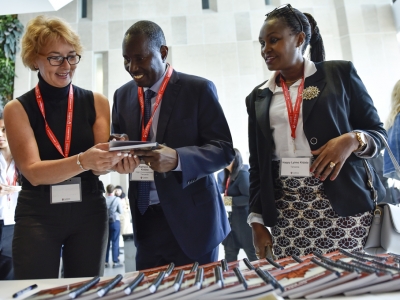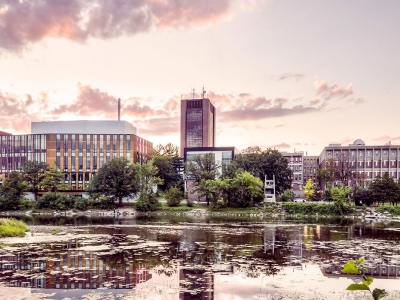By Karen Kelly
Photos by Fangliang Xu
It is something the original students in Carleton’s journalism program never would have imagined: the 75th anniversary of the program they started in 1945 was marked by a streaming virtual event on Oct. 9, 2020, on the school’s Instagram site in the midst of a global pandemic.
But the history of the “j-school” remained a strong presence throughout, as journalism program head Allan Thompson spoke from a lectern fashioned from a vintage radio cabinet at Knox Presbyterian Church in downtown Ottawa, where the journalism program’s early classes were held.
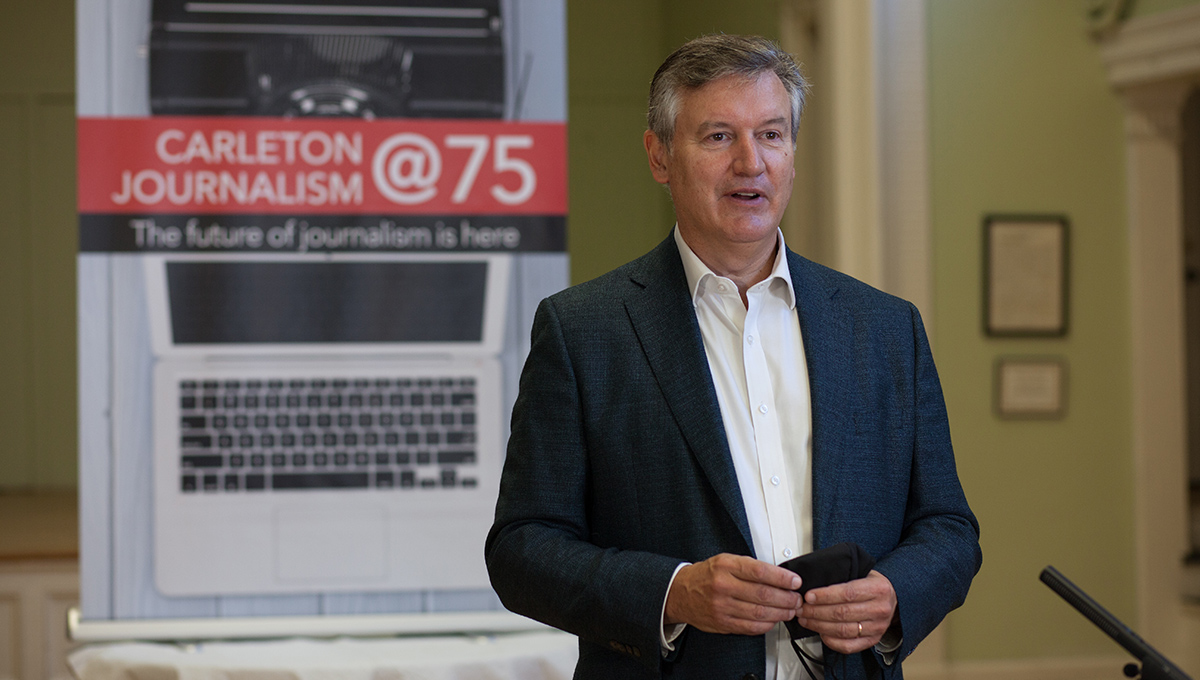
Journalism Program Head Allan Thompson
“Seventy-five years ago today, an upstart institution known as Carleton College—the future Carleton University—established Canada’s first journalism school. That moment transformed journalism in this country,” said Thompson, who is also associate director of the School of Journalism and Communication.
“In the era of COVID, we had to put aside our original plans for a gala, a major keynote address and a reunion of thousands of graduates but we didn’t want this key date to go by without some recognition.”
Thompson stressed the importance of the event in acknowledging the “reckoning” that was overdue in addressing the “rightful and well-grounded charges of systemic racism” in both the Canadian media and the journalism school specifically.
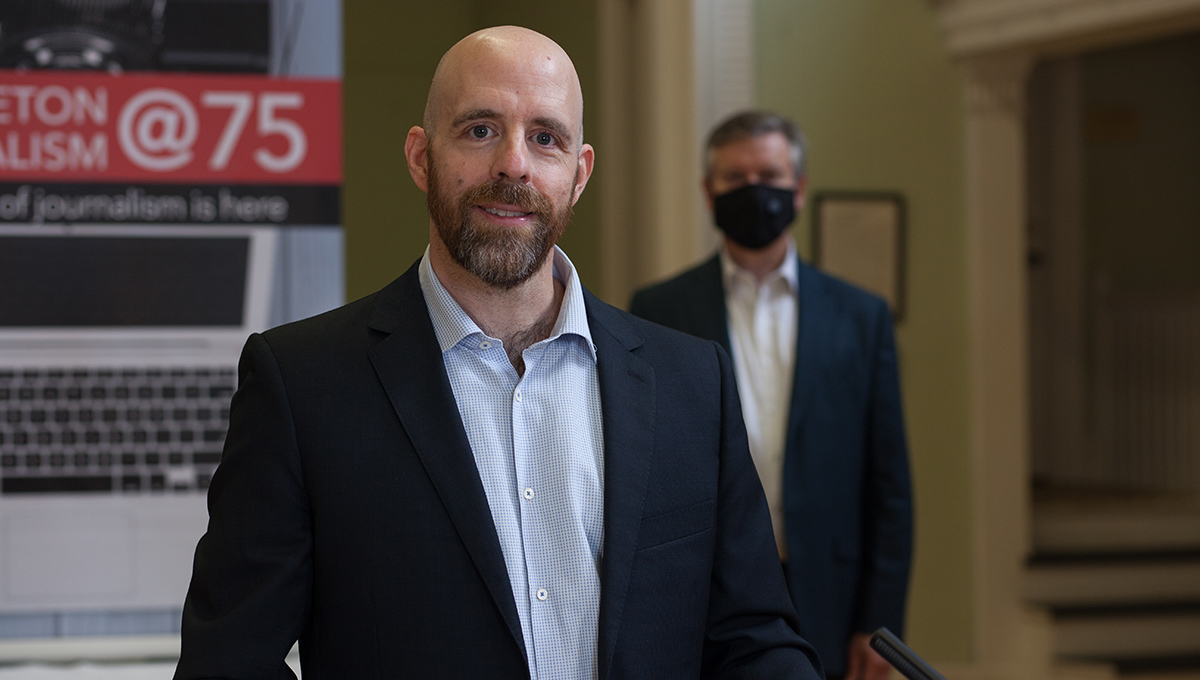
President Benoit-Antoine Bacon
Those sentiments were echoed by Carleton President Benoit-Antoine Bacon and Brenda O’Neill, dean of the Faculty of Public Affairs, who joined him at Knox Presbyterian. Student representative Baneet Braich also joined the event remotely. All reflected on the influence of the program over the past 75 years.
“The 75th anniversary of the school of journalism provides us with the opportunity to reflect on the impact that this institution has had, not only on the journalistic profession in the country, but also on Canada itself,” said Bacon.
O’Neill, who took over as dean of the Faculty of Public Affairs on October 1, also recognized the societal impact of the program.
“Indeed, since moving to Ottawa, I realize that when listening to the local CBC station, you are reminded morning, noon and night of the impact that graduates of Carleton’s journalism program have in the Canadian media industry,” she said.
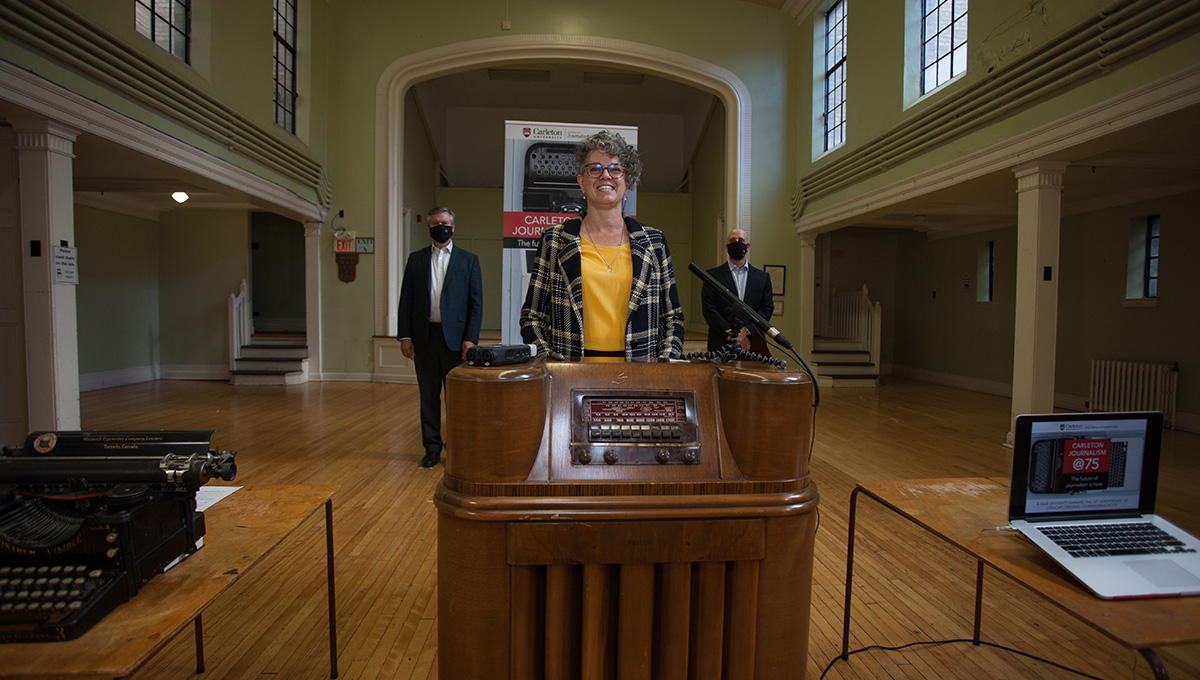
Celebrating its Community Roots
Thompson described how the site of the commemoration, Knox Presbyterian Church, plays an important part in Carleton’s history. Student Jim Coulter, a returning veteran, wrote a journal entry describing one of these classes, which included then-President Henry Marshall Tory.
“It is perhaps significant that we occupy during the week the room in which the Sunday school kindergarten meets. Dr. Tory was on the job early, arranging the chairs and tables and generally floating around in the manner of a concerned hen with unruly chickens,” wrote Coulter on Oct. 22, 1945.
The journalism program moved to the current campus upon its unveiling in 1959.
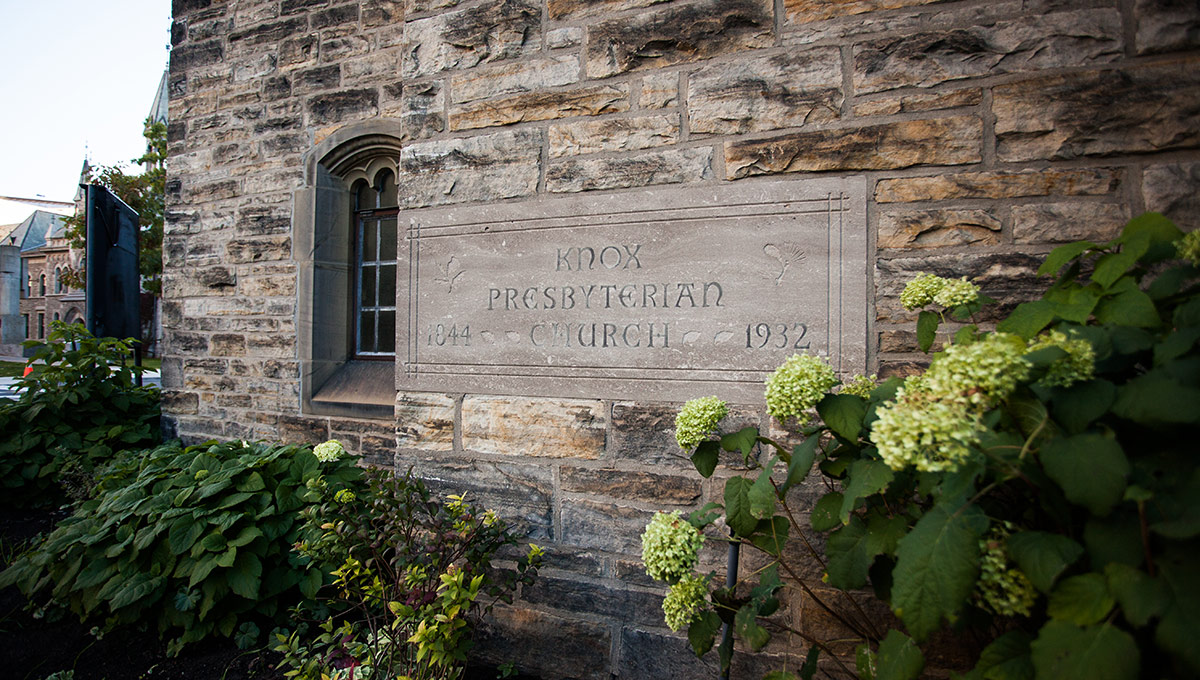
An Opportunity for Reflection
The program will mark the 75th anniversary over the course of the coming year, beginning with the Journalism in a Time of Crisis Symposium on Oct. 22 and 23. The program will also host its annual lectures—the Kesterton and the Stursberg—as well as a speakers series on the state of journalism in Canada.
In addition, the School of Journalism and Communication has established the Future of Journalism Initiative (FJI). This initiative is a collaborative hub where journalists, academics and students work together and independently on innovative projects that further the collective knowledge and understanding of journalism practice. Thompson expects this will contribute to the conversations taking place over the coming year as they discuss the challenges facing the profession.
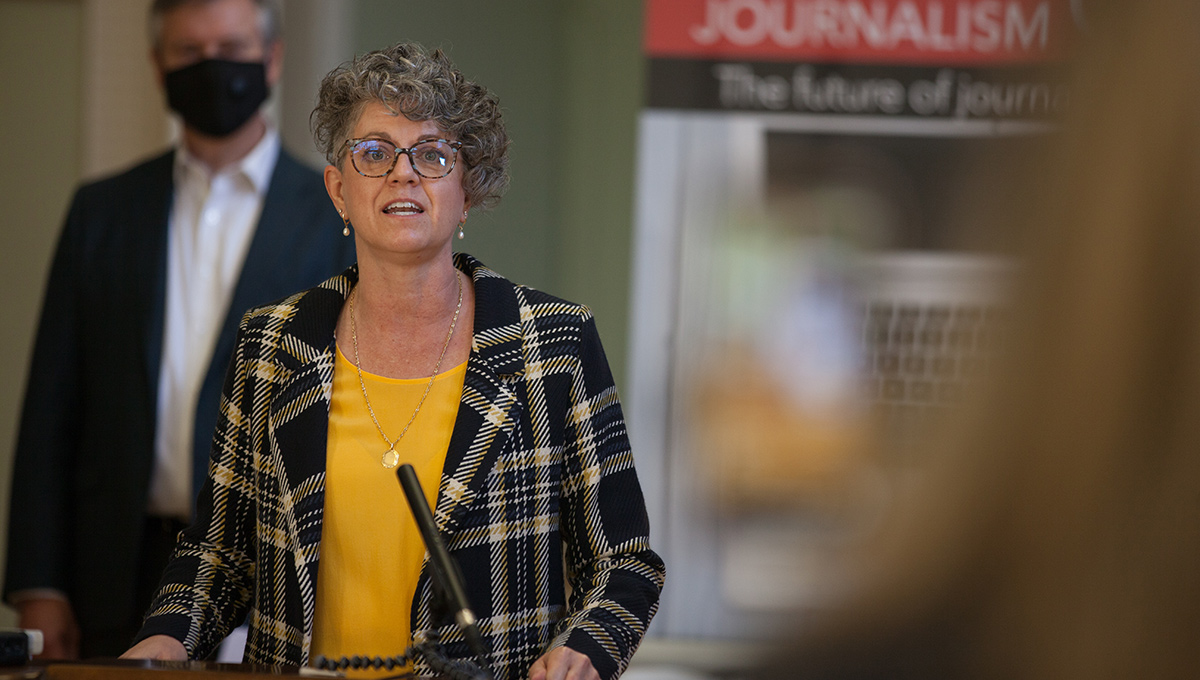
Faculty of Public Affairs Dean Brenda O’Neill
“We have to strike a balance between celebrating and confronting the challenges we face,” noted Thompson.
“For one, the industry was already in a financial crisis. That is being compounded by the impact of COVID.”
In a letter to alumni recently, he addressed the “rightful and well-grounded charges of systemic racism in Canadian media and in our program.”
“Carleton’s School of Journalism and Communication recently voted overwhelmingly in support of a number of commitments to address racism against Black, Indigenous and People of Colour, as well as intolerance based on ethnicity, religion, gender, sexual orientation and ability. These major steps had been in the works for some time, but also recognized a call to action from a group of BIPOC students, alumni, and faculty members. As the head of Carleton’s journalism program, I’m deeply committed to the steps we are taking to foster greater diversity and inclusion as we tackle institutionalized racism.”
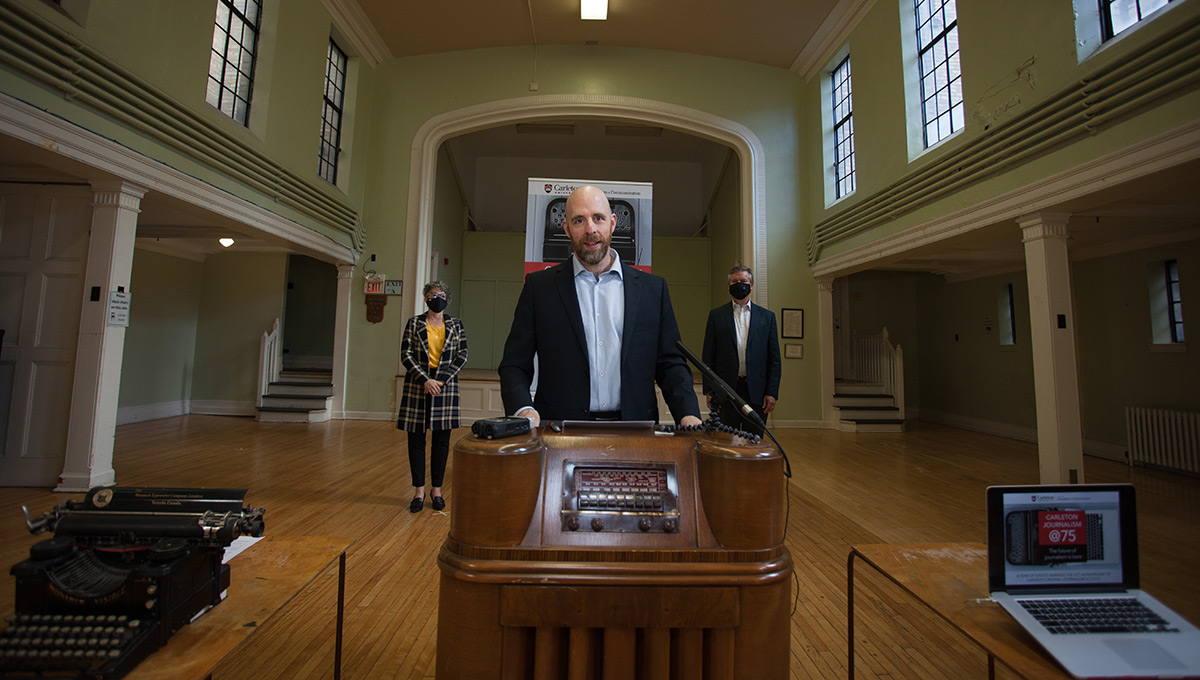
Student speaker Baneet Braich also addressed the importance of this issue for Carleton’s journalism school at this moment in the program’s history.
“We spend our careers amplifying the voices of others, but we forget to talk about our issues because who really interviews the journalists? This generation of journalists is learning to hold our institutions and our employers accountable,” said Braich.
“We are breaking the silence and asking questions like, ‘Hey man, why is it that every tenured professor in this department is white? Or: ‘There’s this piece I want to work on, but my editor or my professor just doesn’t get it.’ These are the realities coming to the surface. Its movements like Black Lives Matter. It’s our own alumni and students in newsrooms who are making some noise.”
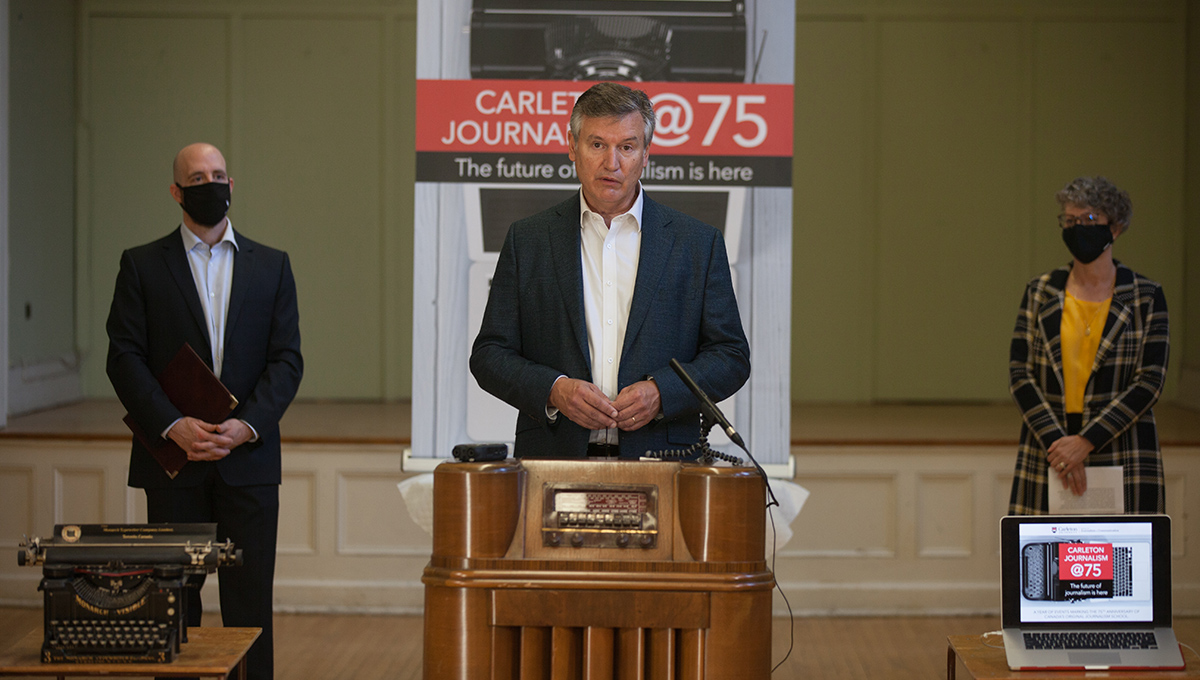
Looking to the Future
While the journalism program had to delay any large gatherings for the foreseeable future, Thompson is hopeful that journalism faculty, students and alumni will have a chance to celebrate the next milestone in person: the 75th anniversary of the first graduates in journalism will be in October 2021.
A video recording of the Oct. 9 Instagram Live event is now available on the school’s Instagram site.

Journalism in the Time of Crisis Symposium
Friday, October 9, 2020 in Journalism and Communication
Share: Twitter, Facebook

